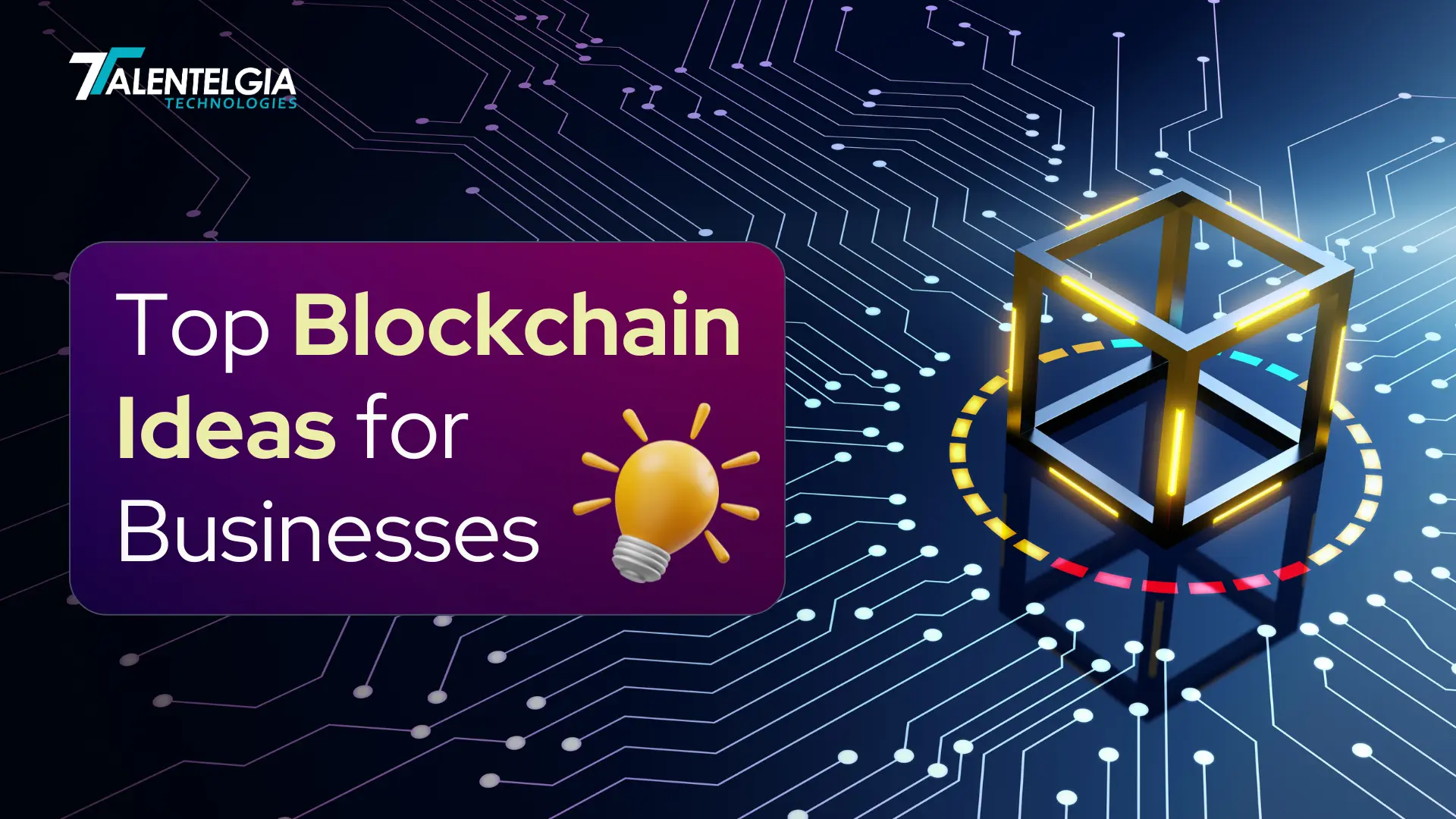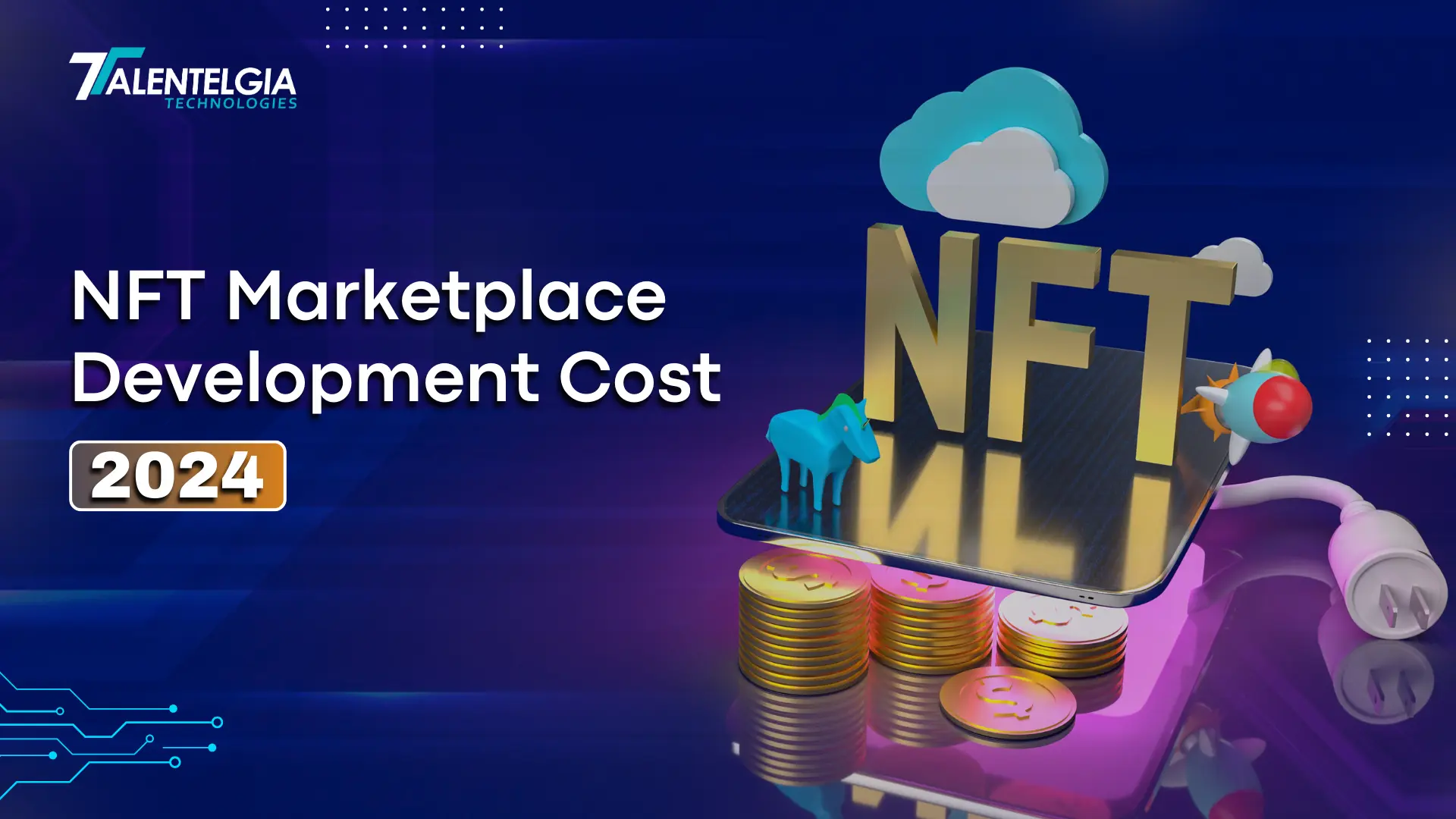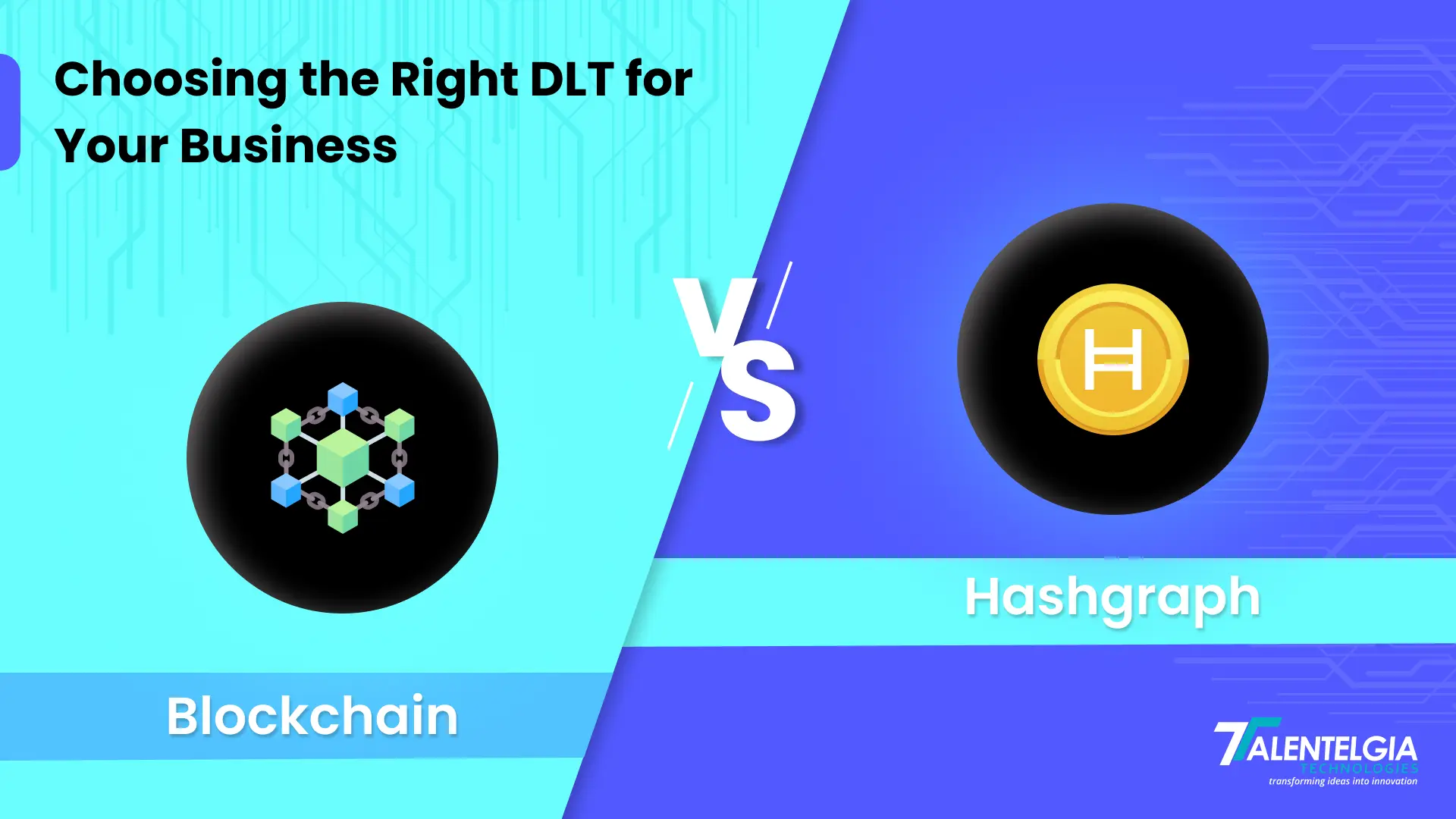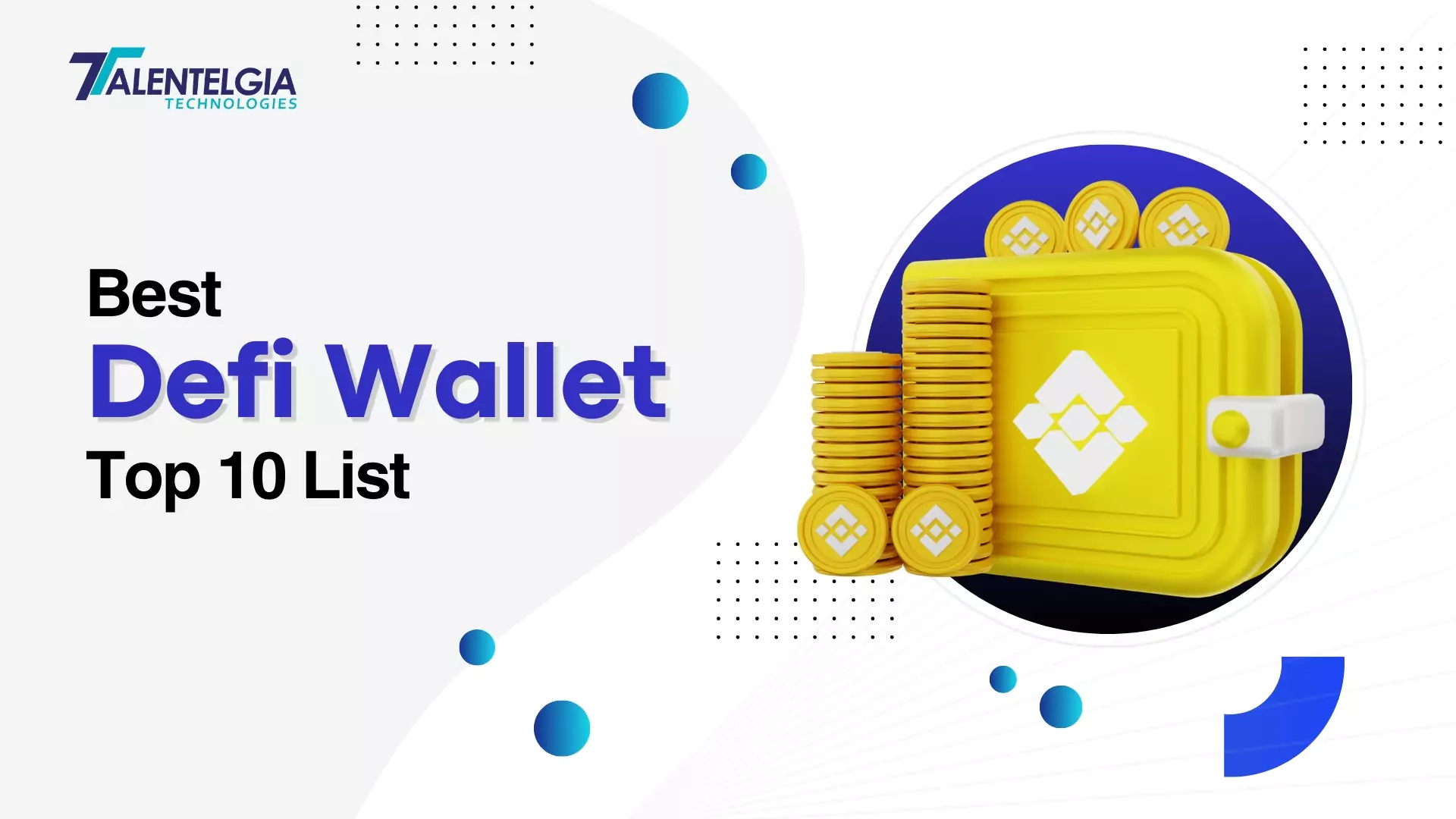Businesses are transforming, and blockchain technology is at the forefront of these changes. Its potential to disrupt traditional models and create entirely new ones is undeniable.
Blockchain development underpins a secure and transparent method for recording transactions
One of the defining characteristics of blockchain is its ability to improve processes, increase accuracy, and increase trust without the need for intermediaries.
Large enterprises such as IBM, Coinbase, and Binance have unlocked many financial opportunities by using the huge potential of blockchain. If you’re ready to start your blockchain venture, it’s the right time to start looking for top blockchain ideas for businesses for your startup.
This technology facilitates security and anonymity. It works by enabling peer-to-peer transactions and performing two important functions simultaneously:
1. Protect information.
2. Facilitating exchange
While the Internet was associated with valuable resources such as email and text, the history of the modern Internet includes assets that have value and remain valid. But blockchain encodes these assets on a network chain, allowing them to be stored and transmitted securely.
What is Blockchain?
Blockchain is a distributed digital ledger system in which information transactions are securely locked and distributed. This technology ensures transparency and improves the integrity of the transfer of sensitive data, a critical asset in our digital age
Blockchain offers safety to businesses. So businesses are investing in blockchain software development more and more, especially in cryptocurrency.
Keeping track of taxes can be challenging for businesses dealing with cryptocurrency. That’s where blockchain tools come in handy, making it easier to report and manage cryptocurrency investments.
Therefore our team has put together a list of top blockchain ideas for businesses that could work for you.
Top Blockchain Ideas for Businesses
Due to several benefits across different industries, many entrepreneurs are keen to integrate blockchain technology into their operations. Therefore many businesses now support blockchain, especially the cryptocurrency business.
Blockchain has attracted many businesses since its inception in 2009 because of its transparency and security of their operations.
Innovative blockchain solutions promise to make your business more efficient, secure, and profitable in the changing digital ecosystem. Let’s look at the top blockchain ideas for businesses.
Blockchain Ticketing Platforms
Blockchain ticketing solutions are designed effectively to solve the common problem of ticket counterfeiting and scaling while simplifying the complexity of the process. This involves creating a powerful platform where participating organizations can issue digital tickets. With all tickets securely locked and managed on the blockchain.
With blockchain, organizations can create transparent and immutable information regarding ticket membership and transactions.
In addition, the blockchain-based ticketing system provides participants with convenient and efficient ticketing. Due to the user-friendly mobile application interface, participants can easily browse, purchase, and verify tickets in real-time and ensure their authenticity. This streamlined process improves the overall ticketing experience. It also reduces the potential for long lines and delays in the venue.
Blockchain ticketing systems provide organizations with better insights and analysis for improving security and convenience.
Pros:
- Enhanced security and authenticity of tickets
- Transparency in ticket transactions
- Reduction in counterfeit tickets and scalping
- Improved efficiency in ticket management
- Potential for innovative features like dynamic pricing
Cons:
- Initial setup costs for implementing blockchain technology
- Potential complexity in user adoption of blockchain-based ticketing systems
- Dependency on network reliability for real-time ticket validation
- Regulatory challenges in certain jurisdictions regarding digital ticketing
- Concerns about data privacy and protection of personal information
Supply Chain Apps
Supply chain management applications are one of the most popular new blockchain concepts, offering solutions to optimize products and services. These new applications effectively monitor all processes in converting raw materials into finished products across all connected devices.
Blockchain-powered supply chain management applications work as a catalyst to increase efficiency and bring the process to good results. It facilitates the integration of business products, improving market efficiency.
Further, many activities in the product ecosystem, including farming, refining, manufacturing, production, packaging, and transportation, benefit from blockchain technology.
The global supply chain management software industry has generated $15 billion in revenue, – Statista.com.
Pros:
- Increased transparency and traceability in supply chain operations
- Reduction in fraud and counterfeit products
- Improved efficiency through automated processes
- Enhanced collaboration among stakeholders
- Potential for real-time monitoring and analytics
Cons:
- Integration challenges with existing supply chain systems
- Dependency on accurate data input for effective tracking
- Scalability and transaction speed issues
Crypto Exchange Platforms
Whether centralized or distributed, crypto exchange platforms allow users to create accounts, deposit funds, and benefit from ever-changing exchange rates.
The daily turnover of these exchanges exceeded $115 billion by the end of 2023 and is expected to increase exponentially.
Among the many cryptocurrency markets, major markets such as Coinbase, Binance, Bybit, Huobi, Gemini, Qmall and Kraken dominate. But things are constantly evolving, and new projects appear every day that aim to improve customer service by providing better work, lower value and the ability to increase. This offers investors an opportunity to create a powerful cryptocurrency trading platform.
The key to success in this highly competitive market these apps is to offer users easy deposits and withdrawals, and a variety of support options. This helps entrepreneurs in the evolving cryptocurrency market as they are prioritizing user experience and using innovative strategies.
Pros:
- Several cryptocurrencies and trading pairs
- Potential for high liquidity and trading volumes
- Lower transaction costs compared to traditional exchanges
- Greater accessibility for retail investors
- Opportunity for arbitrage and speculative trading strategies
Cons:
- Regulatory uncertainty and compliance risks
- Volatility and market manipulation concerns
- Security vulnerabilities and risk of hacking
- Lack of investor protection compared to traditional financial markets
- Limited customer support and recourse in case of disputes
Non-Fungible Token (NFT) Marketplace
Creating a Non-Fungible Token (NFT) marketplace presents another opportunity tailored to cater to various interests such as art, gaming, and real estate. These bridge the gap between buyers and sellers within the NFT ecosystem.
With NFT marketplace development services, businesses can maximize profits through transaction fees, earning a percentage with each successful sale. Additionally, listing fees from artists and creators contribute to revenue generation, while offering premium features like highlighted listings further enhances income streams.
As the owner of the platform, your marketplace becomes a lucrative space where transactions and contributions culminate in success.
Some popular NFT marketplaces are:
OpenSea Clone Script
Rarible Clone Script
SuperRare Clone Script
Foundation, and more.
Pros:
- Unique digital ownership and provenance verification
- Potential for creators to monetize digital assets
- Diversification of investment opportunities beyond traditional markets
- Increased visibility and exposure for artists and content creators
- Ability to fractionalize ownership and trade in secondary markets
Cons:
- Environmental impact due to high energy consumption of blockchain networks
- Speculative nature of NFT investments and price volatility
- Potential for market saturation and diminishing returns for creators
Healthcare Records
The introduction of the technological process into the country to improve solutions for the management and protection of medical information is increasing every minute.
Blockchain is the perfect solution for dealing with complex and sensitive data in healthcare, where privacy and security are critical in the healthcare industry.
Integration of smart contracts further improves the performance of the healthcare system by ensuring the execution of predefined tasks such as access rights, information, and management contracts.
This improves administrative processes, reduces human error, and increases trust between doctors and patients.
Advanced encryption techniques strengthen medical records and prevent unauthorized access or interception, providing security and increasing trust in organizations, appropriate treatment, and patients.
The development of blockchain-powered medical records by hiring a smart contract development company is a welcome advancement in the management of medical records.
Pros:
- Enhanced security and privacy of patient data
- Improved interoperability and data sharing among healthcare providers
- Reduction in administrative overhead and paperwork
- Streamlined processes for patient consent and authorization
- Potential for advanced analytics and predictive modeling for personalized healthcare
Cons:
- Challenges in integrating blockchain with existing healthcare IT systems
- Concerns about data accuracy and integrity
- Regulatory compliance requirements for handling sensitive medical information
- Adoption barriers due to lack of standardized protocols and interoperability
- Potential for unintended consequences such as data breaches or loss of access to critical information
Digital Wallet
Creating a digital wallet application provides a great opportunity for the blockchain industry. As the demand for a centralized platform for managing digital assets continues to grow, wallet apps are the perfect solution.
These applications provide a secure storage solution for cryptocurrencies, providing investors with a secure backup to manage their cryptocurrencies. Additionally, some wallet apps come with advanced features such as integration with exchanges and dApps.
MetaMask is the best example of such a wallet, offering the best crypto wallet experience to investors exploring the crypto space. Compatible with almost all major exchanges and a large list of dApps, MetaMask has a user-friendly interface, making it particularly attractive for beginners in this field.
Consequently, the development of cryptocurrency banking applications represents a profitable area of the market that meets the growing need for fully digital management of assets. These wallets, which offer investors a great experience in the crypto world with their high performance and secure storage capabilities, make recommendations to investors who want to benefit from the popularity of cryptocurrencies.
Pros:
- Easily manage digital devices.
- Improved security features for cryptocurrency storage.
- Integration with exchanges and dApps.
- Easy access from your mobile phone.
Cons:
- Easy to hack and cyber security threats.
- Without proper backup, there is a risk of accessing your money.
- Limited support for some cryptocurrencies and tokens.
- Business value potential and network integration.
Transportation and Logistics Apps
Blockchain technology is helping the transportation and logistics industry with immediate and scalable solutions for order tracking, transition, and authentication. Through blockchain, the supply chain for truck components and used trucks can be seamlessly tracked on a digital ledger, akin to a turbocharged “CARFAX” for the commercial transportation market.
Moreover, blockchain-based transportation and logistics apps promise enhanced efficiency. Utilizing a decentralized public ledger system that records real-time changes, logistics companies stand to streamline operations significantly. This public ledger system meticulously documents the movements of each shipping container, minimizing clerical errors and maximizing efficiency.
Of all technologies, blockchain emerges as the most transformative in transportation and logistics industry apps. Its inherent transparency and reliability empower companies to optimize operations, enhance accountability, and revolutionize the way goods are transported and managed.
Decentralized Cloud Storage
Decentralized cloud storage represents a pivotal aspect of blockchain product development, emphasizing decentralization and peer-to-peer arrangements within apps, platforms, and other resources. Unlike traditional cloud storage providers who wield centralized control over users’ data and tools, decentralized cloud storage ensures enhanced freedom and control.
While traditional cloud storage offers flexibility and seemingly unlimited capacity, users often contend with limited autonomy over their data. Cloud providers retain the authority to deny or block access to data at their discretion, potentially leaving businesses vulnerable and data inaccessible. Moreover, a security breach or attack on the cloud provider could affect data integrity for countless service users.
Decentralized cloud storage disperses data across the network. So the users can enjoy heightened security and sovereignty over their data, safeguarding against potential disruptions or compromises.
Pros:
- Increase data security through shared storage.
- Reduce the risk of data loss or control.
- Make information accessible and usable.
- Increase privacy and manage personal information.
Cons:
- Limited capacity compared to average cloud solutions.
- Data recovery can be slow.
- Rely on network consensus to ensure data integrity.
- More configuration and maintenance.
Decentralized Voting Systems
The shift towards online voting has been gradual over the past decade, driven by the need for accessibility amidst busy schedules and geographical constraints during elections. While online voting presents a promising solution, concerns regarding potential manipulation and fraud on a large scale persist.
Blockchain is a secure framework for e-voting, leveraging its smart contract technology to mitigate risks of tampering and duplicate voting. Blockchain-powered voting systems offer enhanced user verification and transparent voting records, all while safeguarding voter privacy.
While the market for voting dApps remains relatively underdeveloped, notable projects like Voatz, Follow My Vote, and Votem have emerged. However, as blockchain continues to permeate various industries, the potential for voting to join the fray as a mainstream application is ripe. Entrepreneurs stand to capitalize on this burgeoning sector by developing robust, secure, and functional dApps in 2024.
Metaverse Development
The Metaverse concept has caused great excitement lately, especially among entrepreneurs looking for new opportunities. Imagine creating a digital world where people can search, chat with friends, and even start their businesses. It’s like creating a new world full of fun and possibilities! Thanks to metadata, entrepreneurs have the opportunity to unleash their creativity and turn their wildest ideas into reality.
Here’s the best part: The Metaverse is still evolving! As technology continues to advance, user can’t wait to enjoy amazing experiences in this virtual world. So, if you’re an entrepreneur with a passion for innovation, jumping into the metaverse could be your ticket to a world of endless fun and adventure.
Pros:
- Immersive experiences offer new forms of entertainment and social interaction.
- Economic opportunities arise from virtual asset creation and digital commerce.
- Technological innovation drives advancements in VR, AR, AI, and blockchain.
- Creative exploration fosters innovation and experimentation in digital environments.
Cons:
- Accessibility barriers limit participation due to technological and economic constraints.
- Privacy concerns arise from data collection and surveillance within virtual spaces.
- Social impact raises questions about addiction, isolation, and digital well-being.
- Ethical considerations regarding content moderation and virtual property rights require attention.
FAQs
What is Blockchain technology and is it beneficial to the business world?
Blockchain technology is a distributed digital ledger system. Herein the transaction information is securely recorded and distributed among network nodes.
What are the application examples of Blockchain in different sectors?
Finance: Cryptocurrency exchanges and digital wallets.
Medical: Management of electronic medical records and medication traceability.
Supply Chain: Tracking and certification of products from production to delivery.
Voting: secure and transparent electronic voting.
Ownership: Symbolization of ownership for share capital.
How can businesses use blockchain for ticketing solutions and supply chain management?
businesses can use blockchain for ticketing solutions by creating a secure, transparent platform where digital tickets are issued, recorded, and verified. This reduces fraud and increases efficiency.
How does blockchain ensure security?
Blockchain ensures security and trust in transactions by utilizing cryptographic techniques and a decentralized network consensus mechanism.
Conclusion
Blockchain technology is growing and allows businesses to innovate and grow. From voting systems to tokenized assets to a growing metadatabase, investors have many opportunities to explore. Blockchain technology is helping businesses with secure, transparent, and efficient solutions, enabling businesses to succeed in an increasingly digital world. We hope this blog will give businesses insight into some of the best blockchain ideas and inspire entrepreneurs on their journey to success. Whether you want to revolutionize the voting process, digitize assets, or create experiences in the virtual world, it's about finding the right ideas that align with your vision and taking your business to new heights of success.


 Healthcare App Development Services
Healthcare App Development Services
 Real Estate Web Development Services
Real Estate Web Development Services
 E-Commerce App Development Services
E-Commerce App Development Services E-Commerce Web Development Services
E-Commerce Web Development Services Blockchain E-commerce Development Company
Blockchain E-commerce Development Company
 Fintech App Development Services
Fintech App Development Services Fintech Web Development
Fintech Web Development Blockchain Fintech Development Company
Blockchain Fintech Development Company
 E-Learning App Development Services
E-Learning App Development Services
 Restaurant App Development Company
Restaurant App Development Company
 Mobile Game Development Company
Mobile Game Development Company
 Travel App Development Company
Travel App Development Company
 Automotive Web Design
Automotive Web Design
 AI Traffic Management System
AI Traffic Management System
 AI Inventory Management Software
AI Inventory Management Software
 AI Software Development
AI Software Development  AI Development Company
AI Development Company  AI App Development Services
AI App Development Services  ChatGPT integration services
ChatGPT integration services  AI Integration Services
AI Integration Services  Generative AI Development Services
Generative AI Development Services  Natural Language Processing Company
Natural Language Processing Company Machine Learning Development
Machine Learning Development  Machine learning consulting services
Machine learning consulting services  Blockchain Development
Blockchain Development  Blockchain Software Development
Blockchain Software Development  Smart Contract Development Company
Smart Contract Development Company  NFT Marketplace Development Services
NFT Marketplace Development Services  Asset Tokenization Company
Asset Tokenization Company DeFi Wallet Development Company
DeFi Wallet Development Company Mobile App Development
Mobile App Development  IOS App Development
IOS App Development  Android App Development
Android App Development  Cross-Platform App Development
Cross-Platform App Development  Augmented Reality (AR) App Development
Augmented Reality (AR) App Development  Virtual Reality (VR) App Development
Virtual Reality (VR) App Development  Web App Development
Web App Development  SaaS App Development
SaaS App Development Flutter
Flutter  React Native
React Native  Swift (IOS)
Swift (IOS)  Kotlin (Android)
Kotlin (Android)  Mean Stack Development
Mean Stack Development  AngularJS Development
AngularJS Development  MongoDB Development
MongoDB Development  Nodejs Development
Nodejs Development  Database Development
Database Development Ruby on Rails Development
Ruby on Rails Development Expressjs Development
Expressjs Development  Full Stack Development
Full Stack Development  Web Development Services
Web Development Services  Laravel Development
Laravel Development  LAMP Development
LAMP Development  Custom PHP Development
Custom PHP Development  .Net Development
.Net Development  User Experience Design Services
User Experience Design Services  User Interface Design Services
User Interface Design Services  Automated Testing
Automated Testing  Manual Testing
Manual Testing  Digital Marketing Services
Digital Marketing Services 
 Ride-Sharing And Taxi Services
Ride-Sharing And Taxi Services Food Delivery Services
Food Delivery Services Grocery Delivery Services
Grocery Delivery Services Transportation And Logistics
Transportation And Logistics Car Wash App
Car Wash App Home Services App
Home Services App ERP Development Services
ERP Development Services CMS Development Services
CMS Development Services LMS Development
LMS Development CRM Development
CRM Development DevOps Development Services
DevOps Development Services AI Business Solutions
AI Business Solutions AI Cloud Solutions
AI Cloud Solutions AI Chatbot Development
AI Chatbot Development API Development
API Development Blockchain Product Development
Blockchain Product Development Cryptocurrency Wallet Development
Cryptocurrency Wallet Development About Talentelgia
About Talentelgia  Our Team
Our Team  Our Culture
Our Culture 
 Healthcare App Development Services
Healthcare App Development Services Real Estate Web Development Services
Real Estate Web Development Services E-Commerce App Development Services
E-Commerce App Development Services E-Commerce Web Development Services
E-Commerce Web Development Services Blockchain E-commerce
Development Company
Blockchain E-commerce
Development Company Fintech App Development Services
Fintech App Development Services Finance Web Development
Finance Web Development Blockchain Fintech
Development Company
Blockchain Fintech
Development Company E-Learning App Development Services
E-Learning App Development Services Restaurant App Development Company
Restaurant App Development Company Mobile Game Development Company
Mobile Game Development Company Travel App Development Company
Travel App Development Company Automotive Web Design
Automotive Web Design AI Traffic Management System
AI Traffic Management System AI Inventory Management Software
AI Inventory Management Software AI Software Development
AI Software Development AI Development Company
AI Development Company ChatGPT integration services
ChatGPT integration services AI Integration Services
AI Integration Services Machine Learning Development
Machine Learning Development Machine learning consulting services
Machine learning consulting services Blockchain Development
Blockchain Development Blockchain Software Development
Blockchain Software Development Smart contract development company
Smart contract development company NFT marketplace development services
NFT marketplace development services IOS App Development
IOS App Development Android App Development
Android App Development Cross-Platform App Development
Cross-Platform App Development Augmented Reality (AR) App
Development
Augmented Reality (AR) App
Development Virtual Reality (VR) App Development
Virtual Reality (VR) App Development Web App Development
Web App Development Flutter
Flutter React
Native
React
Native Swift
(IOS)
Swift
(IOS) Kotlin (Android)
Kotlin (Android) MEAN Stack Development
MEAN Stack Development AngularJS Development
AngularJS Development MongoDB Development
MongoDB Development Nodejs Development
Nodejs Development Database development services
Database development services Ruby on Rails Development services
Ruby on Rails Development services Expressjs Development
Expressjs Development Full Stack Development
Full Stack Development Web Development Services
Web Development Services Laravel Development
Laravel Development LAMP
Development
LAMP
Development Custom PHP Development
Custom PHP Development User Experience Design Services
User Experience Design Services User Interface Design Services
User Interface Design Services Automated Testing
Automated Testing Manual
Testing
Manual
Testing About Talentelgia
About Talentelgia Our Team
Our Team Our Culture
Our Culture

















 Write us on:
Write us on:  Business queries:
Business queries:  HR:
HR: 




